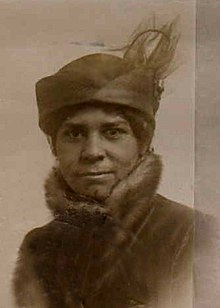Jennie B. Moton
| Jennie B. Moton | |
|---|---|
 |
|
| Born |
Jennie Dee Booth February 24, 1879 Roanes, Virginia |
| Died | December 23, 1942 (aged 63) Hampton, Virginia |
| Resting place | Hampton Institute |
| Nationality | American |
| Alma mater | Hampton Institute |
| Known for | Clubwoman, Agricultural field officer |
| Spouse(s) | Robert R. Moton |
| Children | 5 |
Jennie B. Moton (1879-1942) was an African-American educator and clubwoman. As a special field agent for the Agricultural Adjustment Administration (AAA) in the 1930s and 40s, she worked to improve the lives of rural African Americans in the South. She directed the department of Women's Industries at the Tuskegee Institute, presided over the Tuskegee Woman's Club, and was a two-term president of the National Association of Colored Women (NACW).
In 1941, she was one of several influential black leaders who helped persuade President Franklin D. Roosevelt to sign Executive Order 8802.
Jennie Dee Booth was one of twelve siblings born to Robert and Ellen Booth. Her father was a farmer and oysterer; both of her parents were multiracial. She graduated from the Hampton Institute in Virginia in 1900.
After graduating from college, she taught for eight years at the Hampton Institute's Whittier Training School, where students practiced pedagogy.
She married Robert R. Moton on July 1, 1908; the couple had five children. Robert Moton went on to succeed Booker T. Washington as principal of the Tuskegee Institute in Alabama in 1915. As the principal's wife, Jennie Moton devoted much of her time to the Institute; historian Janet Sims-Wood calls her "the driving force behind her husband." As vice-president of the Tuskegee Woman's Club, she became close friends with the widowed Margaret M. Washington, who stayed on as club president.
In 1920, Moton was one of the speakers at a conference of the Commission on Interracial Cooperation in Memphis, Tennessee, along with Washington, Elizabeth Ross Haynes, and Charlotte Hawkins Brown. Lugenia Burns Hope also contributed to the drafts. Addressing a white audience, the women offered their perspective on topics such as child welfare, suffrage, education, protection of black girls, and the eradication of lynching. In 1924, Moton was elected to the executive board of the Southern Interracial Committee.
...
Wikipedia
